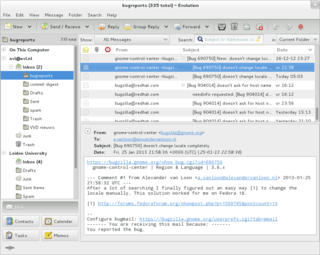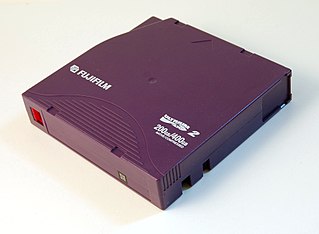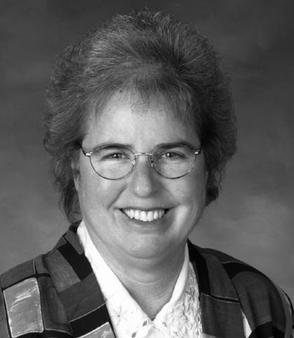
Nokia Bell Labs, originally named Bell Telephone Laboratories (1925–1984), then AT&T Bell Laboratories (1984–1996) and Bell Labs Innovations (1996–2007), is an American industrial research and scientific development company owned by Finnish company Nokia. With headquarters located in Murray Hill, New Jersey, the company operates several laboratories in the United States and around the world.

Electronic mail is a method of exchanging messages ("mail") between people using electronic devices. Email was thus conceived as the electronic (digital) version of, or counterpart to, mail, at a time when "mail" meant only physical mail. Email later became a ubiquitous communication medium, to the point that in current use, an email address is often treated as a basic and necessary part of many processes in business, commerce, government, education, entertainment, and other spheres of daily life in most countries.

A hard disk drive (HDD), hard disk, hard drive, or fixed disk, is an electro-mechanical data storage device that stores and retrieves digital data using magnetic storage with one or more rigid rapidly rotating platters coated with magnetic material. The platters are paired with magnetic heads, usually arranged on a moving actuator arm, which read and write data to the platter surfaces. Data is accessed in a random-access manner, meaning that individual blocks of data can be stored and retrieved in any order. HDDs are a type of non-volatile storage, retaining stored data when powered off. Modern HDDs are typically in the form of a small rectangular box.

Streaming media is multimedia that is delivered and consumed in a continuous manner from a source, with little or no intermediate storage in network elements. Streaming refers to the delivery method of content, rather than the content itself.

Universal Serial Bus (USB) is an industry standard that establishes specifications for cables, connectors and protocols for connection, communication and power supply (interfacing) between computers, peripherals and other computers. A broad variety of USB hardware exists, including 14 different connector types, of which USB-C is the most recent and the only one not currently deprecated.
Connectionless communication, often referred to as CL-mode communication, is a data transmission method used in packet switching networks in which each data unit is individually addressed and routed based on information carried in each unit, rather than in the setup information of a prearranged, fixed data channel as in connection-oriented communication.

Akamai Technologies, Inc. is an American content delivery network (CDN), cybersecurity, and cloud service company, providing web and Internet security services. Akamai's Intelligent Edge Platform is one of the world's largest distributed computing platforms. The company operates a network of servers worldwide and rents capacity of the servers to customers wanting to increase efficiency of their websites by using Akamai owned servers located near the user. When a user navigates to the URL of an Akamai customer, their browser is directed by Akamai's domain name system to a proximal edge server that can serve the requested content. Akamai's mapping system assigns each user to a proximal edge server using sophisticated algorithms such as stable matching and consistent hashing, enabling more reliable and faster web downloads. Further, Akamai implements DDoS mitigation and other security services in its edge server platform.

Linear Tape-Open (LTO) is a magnetic tape data storage technology originally developed in the late 1990s as an open standards alternative to the proprietary magnetic tape formats that were available at the time. Hewlett Packard Enterprise, IBM, and Quantum control the LTO Consortium, which directs development and manages licensing and certification of media and mechanism manufacturers.
This article lists communication protocols that are designed for file transfer over a telecommunications network.
IP multicast is a method of sending Internet Protocol (IP) datagrams to a group of interested receivers in a single transmission. It is the IP-specific form of multicast and is used for streaming media and other network applications. It uses specially reserved multicast address blocks in IPv4 and IPv6.
The Technology and Engineering Emmy Awards, or Technology and Engineering Emmys, are one of two sets of Emmy Awards that are presented for outstanding achievement in engineering development in the television industry. The Technology and Engineering Emmy Awards are presented by the National Academy of Television Arts and Sciences (NATAS), while the separate Primetime Engineering Emmy Awards are given by its sister organization the Academy of Television Arts & Sciences (ATAS).
The UDP-based File Transfer Protocol (UFTP) is a communication protocol designed to transfer files to multiple recipients. To accomplish this, UFTP multicasts the files to recipients via the User Datagram Protocol (UDP). The reference implementation of UFTP is open-source software distributed under the GNU General Public License Version 3. The author of UFTP and its reference protocol is Dennis Bush.
Magnetic-tape data storage is a system for storing digital information on magnetic tape using digital recording.
A reliable multicast is any computer networking protocol that provides a reliable sequence of packets to multiple recipients simultaneously, making it suitable for applications such as multi-receiver file transfer.
GlobalFoundries Inc. is a multinational semiconductor contract manufacturing and design company incorporated in the Cayman Islands and headquartered in Malta, New York. Created by the divestiture of the manufacturing arm of AMD, the company was privately owned by Mubadala Investment Company, the sovereign wealth fund of the United Arab Emirates, until an initial public offering (IPO) in October 2021.
The Linear Tape File System (LTFS) is a file system that allows files stored on magnetic tape to be accessed in a similar fashion to those on disk or removable flash drives. It requires both a specific format of data on the tape media and software to provide a file system interface to the data.
Brotli is a lossless data compression algorithm developed by Google. It uses a combination of the general-purpose LZ77 lossless compression algorithm, Huffman coding and 2nd-order context modelling.
The Primetime Engineering Emmy Awards, or Engineering Emmys, are one of two sets of Emmy Awards that are presented for outstanding achievement in engineering development in the television industry. The Primetime Engineering Emmys are presented by the Academy of Television Arts & Sciences (ATAS), while the separate Technology and Engineering Emmy Awards are given by its sister organization, the National Academy of Television Arts and Sciences (NATAS).

The Fast Adaptive and Secure Protocol (FASP) is a proprietary data transfer protocol. FASP is a network-optimized network protocol developed by Aspera, owned by IBM. The associated client/server software packages are also commonly called Aspera. The technology is patented under US Patent #20090063698, Method and system for aggregate bandwidth control.

Joan Laverne Mitchell was an American computer scientist, data compression pioneer, and inventor who, as a researcher at IBM, co-invented the JPEG digital image format.









